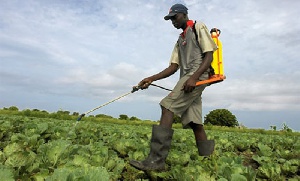The Ghana Environment and Climate Change Policy Action Node, a grantee of Alliance for a Green Revolution in Africa (AGRA), has as one of its activities “…to review the Agricultural Extension Guidelines of Ghana and make it climate smart”.
It has emerged that although Ghana passed the Agricultural Extension Policy in 2007, the guidelines for its implementation have not yet been developed -- and therefore there is no Agricultural extension guideline for the Node to review.
Consequently, the Node sought approval and support from AGRA to develop an Agricultural Extension Guideline for Ghana.
The Environment Policy Action Node is working on policies of Ghana to determine whether they are climate change sensitive and whether the policies take smallholder farmers into consideration. The project has duration of three years and is coordinated by the Science and Technology Policy Research Institute of the Council for Scientific and Industrial Research (CSIR)
The Environment and Climate Change Policy Action Node, otherwise referred to as the Environment Node, comprises the following member-institutions: Science and Technology Policy Research Institute (CSIR-STEPRI); College of Agriculture and Consumer Sciences, School of Agriculture; Department of Agricultural Economics and Agribusiness) (UG); Conservation Alliance (CA); Ministry of Food and Agriculture (MoFA); Environmental Protection Agency (EPA); Care International and The Development Institute (DI).
With the granting of needed financial support by AGRA, the Node approached the Directorate of Agricultural Extension Services (DAES) and Directorate of Crop Services (DCS) of the Ministry of Food and Agriculture (MoFA) to help develop agricultural extension guidelines for the country.
The Director of DAES put together a Technical Team comprising officials from DAES and the CSD to work with the Node. After several meetings and consultations with various stakeholders, the Technical Team produced a draft document on agricultural extension guidelines.
When the Node received it, it used it as a working document, circulating it among its members and also to its team leader Dr. Evelyn Namubiru-Mwaura in Nairobi -- who in turn gave it to experts of extension in AGRA for their comments and inputs.
Agricultural extension is taking a new dimension because of a global movement for reforming the national extension systems in developing countries that started in the late twentieth century. New learning needs of farming communities are emerging as the world enters into an era of globalisation, democracy, privatisation and decentralisation, affecting farmers of both the developed and developing countries -- albeit in different ways.
Extension in the developing countries indeed has a very new role, and needs the serious attention of policy-makers for its meaningful reform and modernisation. With dwindling public funding, it has become imperative for the promotion of more demand-driven, pluralistic extension and advisory services with active participation from the private sector and other stakeholders.
The Coordinator of the Node, Dr. Nelson Obirih-Opare, told B&FT that various inputs into the draft guidelines have been made, but as the technical team was in the throes of wrapping-up the process they realised agro-dealers are also important stakeholders along the agricultural value chain -- hence the need to get inpus from them before the draft is finalised.
With the finalisation of the guidelines, Dr. Obirih-Yeboah is hopeful that, all things being equal, by 2015 Ghana will have guidelines for extension services; especially needed in a time when climate change demands continuous awareness-creation and technology transfer for adaptation and mitigation strategies to farmers.
Mr. Kenneth Nii Abedu, Sales Manager of Wienco Ghana Limited, told this Paper in an interview on the sidelines of the event that a legal framework supporting the work of extensions service providers -- which companies like Wienco are already offering -- will give them the needed confidence to go out and do their job perfectly.
He noted that Wienco not only sells agro-chemicals to farmers but also endeavours to impart new knowledge, by actually organising demonstration fields for farmers to appreciate the value of agro-inputs.
Mr. Francis Osei, CEO of Agxtension Africa -- a private sector agricultural extension service provider and a participant from the private sector making inputs into the Node -- noted that provision has been made in the guidelines for private sector participation but there are not many private sector operators, and hopes his company will serve to energise the guidelines with its participation.
He noted that most smallholder farmers are semi-literate with no strong agricultural background; and since modern agriculture cannot be considered a cultural practice but one imbued with science and technological innovation, it becomes necessary to up their game to increase incomes and productivity.
As a private service provider, he notes that his company offers job opportunities to young agriculturalists to demonstrate and impart their know-how. He said they are not competitors with public extension providers but collaborators; the only challenge is that the smallholder farmer is tempted to believe the service is free though it attracts a fee, since value-for-money service is offered.
Agricultural extension is the term used to describe the process by which rural people are persuaded to adopt improved farming methods and technologies for adding value to crop and livestock to improve productivity.
Agricultural extension provides the bridge between research stations and the farmers, carrying and bringing back knowledge based on local experience for further investigation.
Click to view details



Business News of Tuesday, 16 September 2014
Source: B&FT

















